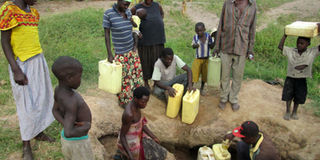Namutumba residents last had a borehole 35 years ago

Source: Residents of Makena Village in Bulange Sub-county, Namutumba District, fetch water from a rock recently. PHOTO BY RONALD SEEBE
What you need to know:
- The district has 602 domestic water points which serve a total of 165,033 people – 157,527 in rural areas.
- According to the Local Government Budget Framework Paper of 2017/2018, the water and environment department in the district intends to prioritise the construction of water sources (protected springs,shallow wells, boreholes, piped water supply system, communal water harvesting systems and public toilets as well as rehabilitation of the water sources.
More than 1,000 residents of Makena Village, Bulange Sub-county in Namutumba District have been drawing water from rocks and swamps for the past 35 years due to lack of boreholes.
The residents say they have never tasted borehole water despite several pleas to the authorities, including President Museveni, to drill boreholes in the district.
“The lack of boreholes and scarcity of water has forced us to resort to drinking water from the rocks. We have also been drawing water from swamps but the severe drought has dried up the swamps as well,” Mr Fredrick Kiirya, a resident, says.
“Our children have grown up and some are married but have never seen a borehole drilled in the area,” he adds.
According to Kiirya, the lack of safe water has become a serious health concern.
He claims they share water sources with animals thus exposing them to diseases such as cholera.
In 2015, while campaigning in Namutumba, President Museveni said government was committed to providing three boreholes per village in the district. However, locals are yet to see the promise come to fruition.
Mr Waiswa Nabongho, another resident, faults district authorities for failing to provide clean water yet they pay taxes.
“The practice of drinking dirty water from rocks has increased cases of waterborne diseases such as diarrhoea and trachoma among school-going children and adults,’’ he says.
Contamination
Mr Mathias Mukasa, another resident, says human waste and cow dung flows into the rock during rainy seasons, worsening the situation.
“We would have no reason for alarm (about boreholes), but the practice of open defecation is worrying us,’’ Mr Mukasa says.
Another resident, Ms Aidha Katengeke, accuses the district leaders of ignoring water and sanitation issues and concentrating on political matters.
“Politicians have been promising us boreholes during campaign seasons but the promises have never been fulfilled. We used to draw water from swamps and the available wells but the prolonged drought has dried them up and caused water scarcity,” Ms Katengeke says.
“Rocks are not permanent water sources. Sometimes they dry up and we are forced to leave them to gather more water which can take between three to four days,’’ she adds.
Namutumba was one of the beneficiaries of a piped water system that was launched in 2010. It was expected to serve 8,000 people in the district. However, the scheme is only in the town council.
The district has 602 domestic water points which serve a total of 165,033 people – 157,527 in rural areas. Seventy-five water points have been non-functional for more than five years and are considered abandoned.
Ms Robinah Nangobi, another resident, says they trek long distances in search of water.
“We wake up at 6am to go and fetch water and return at 1pm because of the long distances,’’ she says.
They have now defied doctors’ directives barring, especially pregnant woman from drinking water from the rocks.
“Many pregnant women are suffering from diarrhoea and other infections because of drinking contaminated water from these rocks,’’ Ms Nangobi says.
Plans underway
When contacted, the LC3 chairperson of Bulange Sub-county, Mr Yakubu Kasoma, says efforts are underway to have a borehole drilled in Makena in the next financial year (2018/2019).
He appealed to residents to preserve the few available water sources as they wait for boreholes.
“We are aware as authorities, and we are sorry for going all those years without a borehole; but I am appealing to you to be patient,’’ he said.
Efforts to talk to the district chairperson, Mr Saleh Kumbuga, were futile after his known phones remained off by press time.
When contacted, the area Member of Parliament, Mr Paul Akamba, said he would ensure that boreholes are drilled.
“As leaders, we are going to do our best to see that the water problem in the district, mainly in Makene, is addressed,’’ Mr Akamba told Daily Monitor in a telephone interview last week.
Water provision at a glance
MDG: Access to safe water is part of human development and a key composition of the United Nation’s Millennium Development Goals. However, many countries in the developing world were still struggling with the attainment of safe water by 2015.
A World Bank report released in 2012 indicated that Uganda loses up to Shs390 billion annually due to costs related to poor sanitation. The report also noted that at least 3.2 million Ugandans have no latrines, with many of them using open space to ease themselves. According to Water Aid, an international organisation, eight million people in Uganda do not have access to safe water.
Namutumba plans: According to the Local Government Budget Framework Paper of 2017/2018, the water and environment department in the district intends to prioritise the construction of water sources (protected springs,shallow wells, boreholes, piped water supply system, communal water harvesting systems and public toilets as well as rehabilitation of the water sources. As such, 28 deep wells will be sited, drilled, cast and installed.
Constraints: However, the department receives insufficient funds to meet the high demand for the water facilities, lengthy procurement process and delays in implementation of projects.




